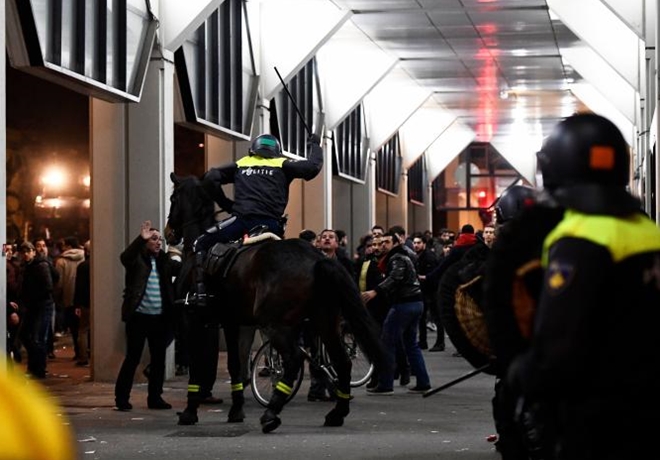Turkey targets Dutch with diplomatic sanctions as 'Nazi' row escalates
- Turkey's Erdogan says Netherlands acting like a 'banana republic'
- Turkey seeks to build Syrian military cooperation with Russia
- Turkey says U.S. not insisting on Kurdish role in Raqqa operation
- Trump after Berlin, Turkey attacks: 'I've been proven to be right'
The sanctions - which include a ban on the Dutch ambassador and diplomatic flights from the Netherlands but do not appear to include economic measures or travel restrictions for ordinary citizens - mark another low point in relations between Turkey and the European Union, which it still officially aims to join.
President Tayyip Erdogan, who is seeking Turkish voters' support in an April 16 referendum on boosting his powers as head of state, has previously accused the Dutch government of acting like "Nazi remnants" for barring his ministers from addressing expatriate Turks to drum up votes.
 |
| Riot police clash with demonstrators in the streets near the Turkish consulate in Rotterdam, Netherlands March 12, 2017. REUTERS/Dylan Martinez |
The row is likely to further dim Ankara's prospects of EU membership. It also comes as Turkey wrestles with security concerns over militant attacks and the war in neighboring Syria.
"We are doing exactly what they did to us. We are not allowing planes carrying Dutch diplomats or envoys from landing in Turkey or using our airspace," Deputy Prime Minister Numan Kurtulmus told a news conference after a cabinet meeting. "Those creating this crisis are responsible for fixing it."
Kurtulmus, the government's chief spokesman, also threatened to scrap Turkey's deal to stop the flow of migrants into Europe, saying the agreement may need to be re-evaluated. He said high-level government meetings would be suspended between the two countries until the Netherlands had atoned for its actions.
Earlier Erdogan threatened to take the Dutch to the European Court of Human Rights.
Turkey also summoned the Dutch charge d'affaires on Monday to complain about the ban - imposed due to fears of unrest and also to Dutch distaste at what Europe sees as an increasingly authoritarian tone from Erdogan - and the actions of police against Turkish protesters in Rotterdam over the weekend, foreign ministry sources said.

